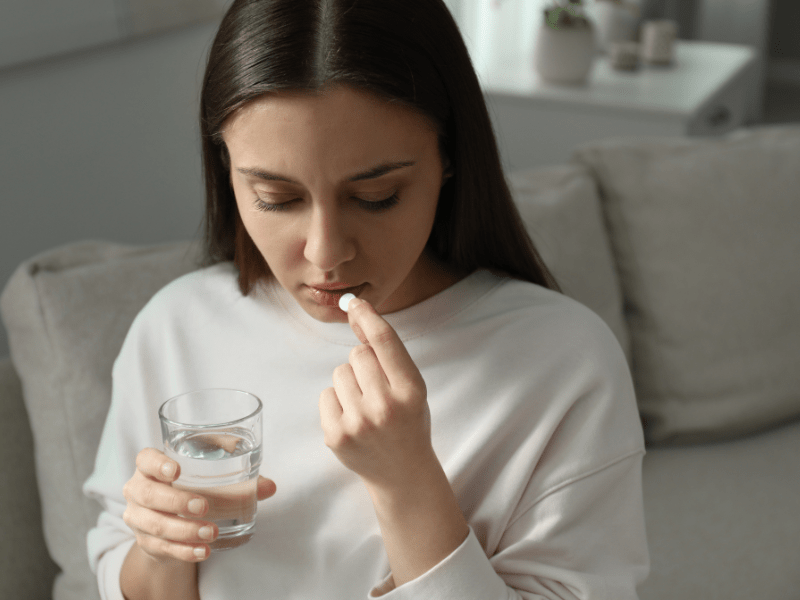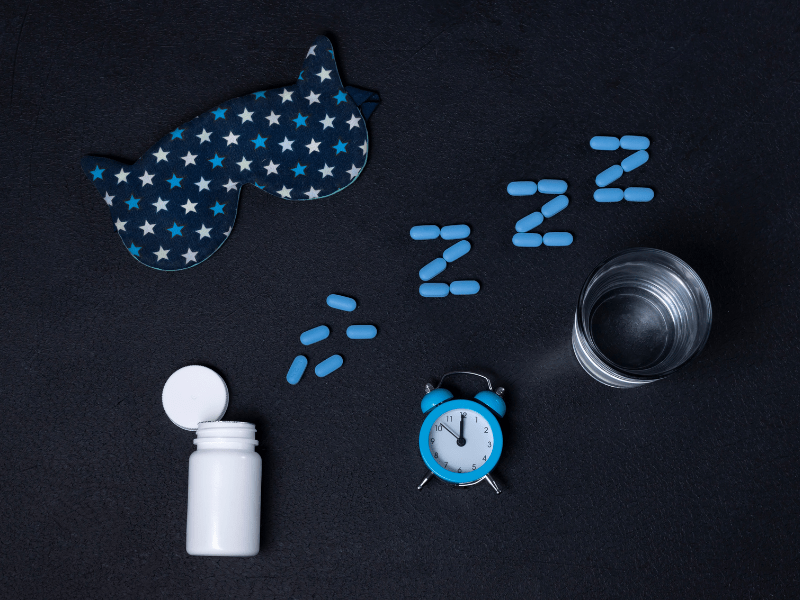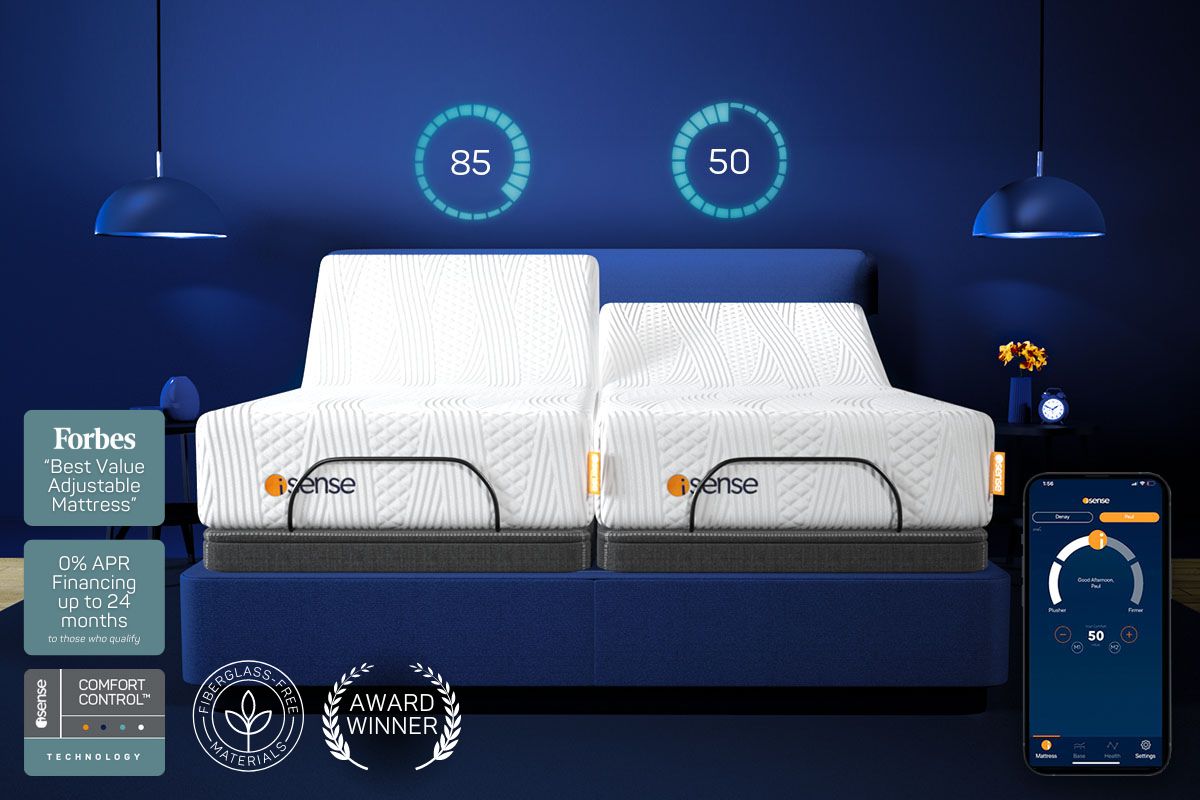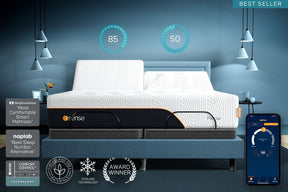Introduction
Are you struggling to fall asleep at night and suspect your screen time might be to blame? Recent studies have shown that exposure to blue light, primarily from digital devices, can severely impact our sleep patterns.
This blog post will delve into the science behind how blue light affects our sleep and provide practical tips on managing your exposure for a good night's rest. Ready for a deep dive into better sleeping habits?.
The Effects of Blue Light on Sleep
Blue light has several negative effects on sleep, including the suppression of melatonin, disruption of circadian rhythm, and a reduction in sleep quality and duration.
Suppression of melatonin
Exposure to the glow of digital devices and artificial lighting, particularly blue light, can wreak havoc on our sleep. Blue light's wavelength suppresses melatonin production—our body's natural sleep-inducing hormone—and tricks the brain into thinking it's daylight. This leads to a delay in the start of our physiological nighttime, disrupting our circadian rhythms - the body's internal clock controlling our wake and sleep cycle. The result is an ill-timed alertness that reduces both sleep quality and duration.
Regardless of any prevailing myths, this powerful effect of blue light on melatonin secretion holds true for most individuals.
Disruption of circadian rhythm
Blue light has a significant impact on our circadian rhythm, the internal clock that regulates our sleep-wake cycle. Exposure to blue light during the sensitive period of sleep can throw off this natural rhythm and disrupt our ability to fall asleep and stay asleep. Research has shown that blue light suppresses the production of melatonin, a hormone that promotes sleep, more powerfully than any other type of light.
When we are exposed to artificial lighting or digital devices emitting blue light in the evening or at night, it tricks our brain into thinking it's still daytime. This leads to a decrease in melatonin secretion and delays the onset of sleep. As a result, our circadian rhythm is thrown off balance, making it harder for us to feel sleepy when we want to go to bed.
To manage this disruption and improve our sleep quality, it's important to limit exposure to screens before bedtime. This means avoiding using phones or computers for at least an hour before you plan on going to bed.
Additionally, using blue light filters or wearing blue light-blocking glasses can help reduce the amount of blue light reaching your eyes and disrupting your circadian rhythm.
Reduced sleep quality and duration
Excessive exposure to blue light before bedtime can have a significant impact on the quality and duration of your sleep. Research shows that blue light inhibits the production of melatonin, which is essential for promoting a restful sleep. When exposed to blue light from digital devices or artificial lighting in the evening, the brain gets tricked into thinking it's still daytime, leading to a decrease in melatonin release.
This disruption in melatonin secretion not only affects sleep quality but also reduces the overall duration of sleep. Without enough melatonin, you may find it difficult to fall asleep quickly or experience frequent awakenings throughout the night.
This can result in feeling tired and groggy during the day, affecting your productivity and overall well-being.
To counteract these negative effects on sleep quality and duration, it is crucial to limit exposure to screens before bed. Creating a wind-down routine that avoids electronic devices at least one hour before bedtime can help signal to your body that it's time to relax and prepare for sleep.
Additionally, using blue light filters or glasses can reduce the amount of harmful blue light reaching your eyes.
Managing Blue Light for Better Sleep
To promote better sleep, it's important to limit exposure to screens before bed, use blue light filters or glasses, and create a dark and relaxing sleep environment.
Limiting exposure to screens before bed
To ensure better sleep, it is important to limit exposure to screens before bed. Here are some tips to help you do that:
- Create a bedtime routine: Establish a relaxing routine before sleep that doesn't involve screens. This can include activities like reading a book, taking a warm bath, or practicing relaxation techniques.
- Set screen-free zones and times: Designate certain areas of your home, such as the bedroom, as screen-free zones. Additionally, establish specific times when screens are off-limits, especially in the hour leading up to bedtime.
- Avoid stimulating content: Before bed, avoid engaging with content that may be mentally or emotionally stimulating. This can include intense movies or TV shows, news articles, or social media feeds.
- Use blue light filters: Many devices now have built-in settings that reduce blue light emission at night. Enable these features or consider using third-party apps that automatically adjust the screen's color temperature.
- Wear blue light-blocking glasses: If you absolutely need to use screens close to bedtime, wearing blue light-blocking glasses can help mitigate the negative effects of blue light on sleep.
- Opt for relaxing activities: Instead of scrolling through your phone or watching TV before bed, engage in calming activities such as listening to soft music, practicing gentle stretching exercises, or journaling your thoughts and feelings.
- Keep devices out of the bedroom: Create an environment that promotes relaxation and sleep by removing electronic devices from the bedroom altogether. This eliminates the temptation to use screens right before bed and helps create a more peaceful atmosphere.
Using blue light filters or glasses
Blue light filters or glasses can be effective in reducing the negative effects of blue light on sleep. Here are some ways to use them:
- Install a blue light filter app or software on your devices. These filters adjust the color temperature of your screen, reducing the amount of blue light emitted.
- Wear blue light filtering glasses in the evening, especially if you need to use electronic devices before bed. These glasses block or filter out the harmful blue light, allowing your body to produce melatonin naturally.
- Opt for devices with built-in blue light filters. Many smartphones and tablets now come with night mode or blue light reduction settings that you can enable to minimize exposure to blue light.
- Use lamps or bulbs with warm-toned or red lighting in your bedroom instead of bright white lights. Red and warm-toned lights have less impact on melatonin production and can promote better sleep.
- Limit exposure to screens at least an hour before bedtime. This allows your brain to wind down and prepare for sleep without being exposed to stimulating blue light.
Creating a dark and relaxing sleep environment
To create a dark and relaxing sleep environment, there are several steps you can take to improve the quality of your sleep:
- Use blackout curtains or blinds: These can help block out any external light sources, ensuring that your bedroom remains dark throughout the night.
- Turn off electronic devices: Electronic devices emit blue light, which can interfere with your melatonin production. Avoid using phones, tablets, or laptops in bed, especially right before sleep.
- Dim the lights: Before bedtime, gradually dim the lights in your home to signal to your body that it's time to wind down. This will help prepare your brain for sleep.
- Invest in a comfortable mattress and pillows: A good quality mattress and pillows that suit your sleeping style can greatly enhance comfort and improve sleep quality.
- Keep noise levels down: Noise disruptions during sleep can lead to frequent awakenings or difficulty falling back asleep. Consider using earplugs or white noise machines to drown out any unwanted sounds.
- Maintain a cool temperature: The optimal room temperature for sleep is around 65 degrees Fahrenheit (18 degrees Celsius). Adjusting your thermostat or using fans can help create a cool and comfortable sleep environment.
- Develop a bedtime routine: Establishing a consistent pre-sleep routine signals to your body that it's time to unwind and prepare for restful sleep. This could include activities such as reading a book, taking a warm bath, or practicing relaxation techniques like deep breathing.
- Remove distractions: Keep clutter out of sight to create a calm atmosphere in your bedroom. Ensure that you have no bright lights from electronics or digital clocks visible while trying to fall asleep.
Conclusion
In conclusion, the effects of blue light on sleep should not be underestimated. The suppression of melatonin and disruption of circadian rhythms can have a significant impact on sleep quality and duration. However, by managing our exposure to blue light through limiting screen time before bed, using blue light filters or glasses, and creating a dark and relaxing sleep environment, we can improve our chances of getting a good night's rest.
Taking these steps to minimize blue light exposure is essential for maintaining healthy sleep patterns in today's digital age.
FAQs
1. How does blue light affect sleep?
Blue light emitted from electronic devices such as smartphones, tablets, and computers can suppress the production of melatonin, a hormone that regulates sleep. This can disrupt the natural sleep-wake cycle and make it more difficult to fall asleep.
2. What are the sources of blue light that affect sleep?
Common sources of blue light that can affect sleep include smartphones, tablets, computer screens, televisions, and energy-efficient LED lighting. These devices emit high levels of blue light that can interfere with our body's ability to wind down for sleep.
3. How can I reduce my exposure to blue light before bedtime?
To reduce your exposure to blue light before bedtime, you can use software or apps that filter out or limit the amount of blue light emitted by electronic devices. Additionally, practicing good sleep hygiene by avoiding screen time at least an hour before bed and opting for reading a book or engaging in relaxing activities instead can also help.
4. Can wearing blue-light-blocking glasses help improve sleep quality?
Yes, wearing blue-light-blocking glasses in the evening or when using electronic devices before bed has been shown to effectively block harmful blue light wavelengths and promote better quality sleep. These glasses filter out the specific frequencies of blue light known to disrupt melatonin production and circadian rhythms.
iSense creates a customized sleep experience through twenty adjustable-firmness settings on each side of the bed. Relax into customized comfort with consistent, head-to-toe pressure relief only with iSense. If you are looking for a mattress for arthritis, we have a great choice for you.






















